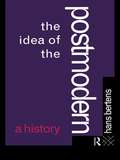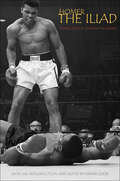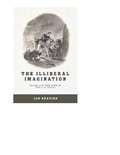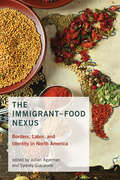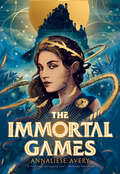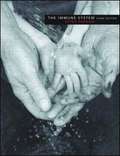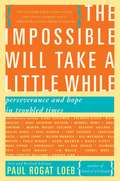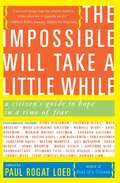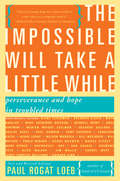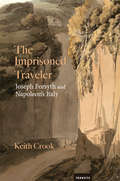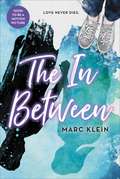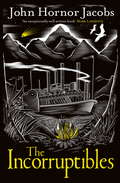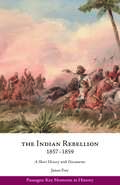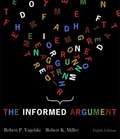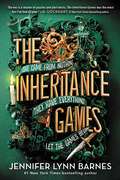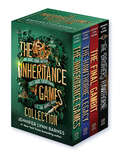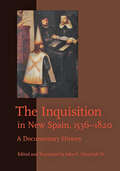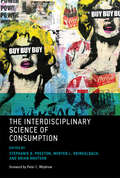- Table View
- List View
The Idea of the Postmodern: A History
by Hans BertensAt last! Everything you ever wanted to know about postmodernism but were afraid to ask.Hans Bertens' Postmodernism is the first introductory overview of postmodernism to succeed in providing a witty and accessible guide for the bemused student. In clear and straightforward but always elegant prose, Bertens sets out the interdisciplinary aspects, the critical debates and the key theorists of postmodernism. He also explains, in thoughtful and illuminating language, the relationship between postmodernism and poststructuralism, and that between modernism and postmodernism.An enjoyable and indispensible text for today's student.
The Iliad (Johns Hopkins New Translations from Antiquity)
by HomerEdward McCrorie offers a new verse translation of the Iliad, capturing the meaning and music of Homer's original Greek.Sing of rage, Goddess, that bane of Akhilleus,Peleus' son, which caused untold pain for Akhaians,sent down throngs of powerful spirits to Aides, war-chiefs rendered the prize of dogs and everysort of bird.Edward McCrorie’s new translation of Homer’s classic epic of the Trojan War captures the falling rhythms of a doomed Troy. McCrorie presents the sundry epithets and resonant symbols of Homer's verse style and remains as close to the Greek's meaning as research allows. The work is an epic with a flexible contemporary feel to it, capturing the wide-ranging tempos of the original. It underscores the honor of soldiers and dwells upon the machinations of Moira, each man's and woman's portion in life.Noted Homeric scholar Erwin Cook contributes a substantial introduction and extensive notes written to guide both students and general readers through relevant elements of ancient Greek history and culture. This version of the Iliad is ideal for readings and performances.
The Illiberal Imagination: Class and the Rise of the U.S. Novel
by Joe ShapiroThe Illiberal Imagination offers a synthetic, historical formalist account of how—and to what end—U.S. novels from the late eighteenth century to the mid-1850s represented economic inequality and radical forms of economic egalitarianism in the new nation. In conversation with intellectual, social, and labor history, this study tracks the representation of class inequality and conflict across five subgenres of the early U.S. novel: the Bildungsroman, the episodic travel narrative, the sentimental novel, the frontier romance, and the anti-slavery novel.Through close readings of the works of foundational U.S. novelists, including Charles Brockden Brown, Hugh Henry Brackenridge, Catharine Maria Sedgwick, James Fenimore Cooper, and Harriet Beecher Stowe, Joe Shapiro demonstrates that while voices of economic egalitarianism and working-class protest find their ways into a variety of early U.S. novels, these novels are anything but radically dialogic; instead, he argues, they push back against emergent forms of class consciousness by working to naturalize class inequality among whites. The Illiberal Imagination thus enhances our understanding of both the early U.S. novel and the history of the way that class has been imagined in the United States.
The Illumined Heart: Capture the Vibrant Faith of Ancient Christians
by Frederica Mathewes-GreenWhy are modern Christians so indistinguishable from everyone else?How come Christians who lived in times of bloody persecution were so heroic, while we who live in safety are not?How could the first Christians fast valiantly, but we feel deprived without dessert?How did New Testament believers pray without ceasing?How could the early Christian martyrs actually forgive their torturers?What did the Christians of the first centuries know that we don't?That's what this book is about.From the author:When I look back at the process of writing The Illumined Heart, I'm amazed all over again at how God directed it. I wrote the whole thing in a week, the week before Christmas, in fact, which is so typically congested with last-minute errands, unpredicatable weather, aches and sniffles. For Orthodox Christians, it's also a week that we fast from meat and dairy, adding another ball to the juggling act. Yet somehow I started writing the book on Monday morning and completed it Sunday night, just fourteen minutes after the Christmas Eve service began. (I kept wondering where in the week I'd dawdled and lost that fourteen minutes.)It's no wonder that I look at The Illumined Heart as the one out of all of my books that felt the most God-directed. Mostly, he told me when to shut up. For a cup-runneth-over writer like me, starting a book is like moving into mid-pregnancy and putting on those stretch-front trousers for the first time; they're like a license to eat. And knowing that I have room to write on and on, whatever comes to mind, makes for abundant, wandering prose. Yet The Illumined Heart is quiet, proportional, just-enough; it's like a jewel. It's no wonder that this is a personal favorite among my own books, and the one I must urge people to read. I'm pleased by the amount of good work it's done so far, and hope that it will continue to do much more.
The Immaterial Self: A Defence of the Cartesian Dualist Conception of the Mind (International Library of Philosophy)
by John FosterDualism argues that the mind is more than just the brain. It holds that there exists two very different realms, one mental and the other physical. Both are fundamental and one cannot be reduced to the other - there are minds and there is a physical world. This book examines and defends the most famous dualist account of the mind, the cartesian, which attributes the immaterial contents of the mind to an immaterial self.John Foster's new book exposes the inadequacies of the dominant materialist and reductionist accounts of the mind. In doing so he is in radical conflict with the current philosophical establishment. Ambitious and controversial, The Immaterial Self is the most powerful and effective defence of Cartesian dualism since Descartes' own
The Immigrant-Food Nexus: Borders, Labor, and Identity in North America (Food, Health, and the Environment)
by Julian Agyeman Sydney GiacaloneThe intersection of food and immigration in North America, from the macroscale of national policy to the microscale of immigrants' lived, daily foodways.This volume considers the intersection of food and immigration at both the macroscale of national policy and the microscale of immigrant foodways—the intimate, daily performances of identity, culture, and community through food. Taken together, the chapters—which range from an account of the militarization of the agricultural borderlands of Yuma, Arizona, to a case study of Food Policy Council in Vancouver, Canada—demonstrate not only that we cannot talk about immigration without talking about food but also that we cannot talk about food without talking about immigration.The book investigates these questions through the construct of the immigrant-food nexus, which encompasses the constantly shifting relationships of food systems, immigration policy, and immigrant foodways. The contributors, many of whom are members of the immigrant communities they study, write from a range of disciplines. Three guiding themes organize the chapters: borders—cultural, physical, and geopolitical; labor, connecting agribusiness and immigrant lived experience; and identity narratives and politics, from “local food” to “dietary acculturation.”ContributorsJulian Agyeman, Alison Hope Alkon, FernandoJ. Bosco, Kimberley Curtis, Katherine Dentzman, Colin Dring, Sydney Giacalone, Sarah D. Huang, Maryam Khojasteh, Jillian Linton, Pascale Joassart-Marcelli, Samuel C. H. Mindes, Laura-Anne Minkoff-Zern, Christopher Neubert, Fabiola Ortiz Valdez, Victoria Ostenso, Catarina Passidomo, Mary Beth Schmid, Sea Sloat, Kat Vang, Hannah Wittman, Sarah Wood
The Immortal Games
by Annaliese AveryThe Blood Moon marks the start of the Immortal Games.The Gods of Olympus randomly select humans as their tokens and then gamble with their lives. The stakes are high and survival is unlikely.17-year-old Ara is seeking revenge on the Gods for allowing her sister to die in the games. She's determined to be selected as a token, but when she is, she realizes that it isn’t just her life at stake, but also her heart. With the odds stacked against her, it will take an unlikely hero to twist her rage into something much more complicated. Ara is playing in the games of life and death… and love. What will she sacrifice?
The Immune System (3rd edition)
by Peter ParhamParham (structural biology, microbiology, immunology, Stanford U.) offers a third edition to his textbook explaining the functions of the human immune system. It is specifically intended for undergraduate students in medical, dental, and pharmacy in immunology courses. Extensively updated, the textbook includes new chapters on innate and adaptive immunity, enhanced treatment of aspects of innate immunity such as the complement system and defensins, immunotherapies, and the nature of immune response in mucosal tissues and immunological memory. It is well-illustrated and includes essay, multiple choice, and case study questions at the conclusion of each chapter. Annotation ©2009 Book News, Inc., Portland, OR (booknews.com)
The Impossible Will Take A Little While: Perseverance And Hope In Troubled Times
by Paul LoebWhat keeps us going when times get tough? How have the leaders and unsung heroes of world-changing political movements persevered in the face of cynicism, fear, and seemingly overwhelming odds? In The Impossible Will Take a Little While, they answer these questions in their own words, creating a conversation among some of the most visionary and eloquent voices of our times. <P> Ten years after his original edition, Paul Rogat Loeb has comprehensively updated this classic work on what it's like to go up against Goliath--whether South African apartheid, Mississippi segregation, Middle East dictatorships, or the corporations driving global climate change. Without sugarcoating the obstacles, these stories inspire the hope to keep moving forward. <P> Think of this book as a conversation among some of the most visionary and eloquent voices of our times--or any time. Contributors include Maya Angelou, Diane Ackerman, Marian Wright Edelman, Wael Ghonim, Václav Havel, Paul Hawken, Seamus Heaney, Jonathan Kozol, Tony Kushner, Audre Lorde, Nelson Mandela, Bill McKibben, Bill Moyers, Pablo Neruda, Mary Pipher, Arundhati Roy, Dan Savage, Desmond Tutu, Alice Walker, Cornel West, Terry Tempest Williams, and Howard Zinn
The Impossible Will Take a Little While: A Citizen's Guide to Hope in a Time of Fear
by Paul Rogat LoebIn The Impossible Will Take a Little While, a phrase borrowed from Billie Holliday, the editor of Soul of a Citizen brings together fifty stories and essays that range across nations, eras, wars, and political movements. Danusha Goska, an Indiana activist with a paralyzing physical disability, writes about overcoming political immobilization, drawing on her history with the Peace Corps and Mother Teresa. Vaclav Havel, the former president of the Czech Republic, finds value in seemingly doomed or futile actions taken by oppressed peoples. Rosemarie Freeney Harding recalls the music that sustained the civil rights movement, and Paxus Calta-Star recounts the powerful vignette of an 18-year-old who launched the overthrow of Bulgaria's dictatorship. Many of the essays are new, others classic works that continue to inspire. Together, these writers explore a path of heartfelt community involvement that leads beyond despair to compassion and hope. The voices collected in The Impossible Will Take a Little While will help keep us all working for a better world despite the obstacles.
The Impossible will Take a Little While: A Citizen's Guide to Hope in a Time of Fear
by Paul Rogat LoebWhat keeps us going when times get tough? How do we keep on working for a more humane world, no matter how hard it sometimes seems? In a time when our involvement has never been needed more, this anthology of political hope will help readers with the essential work of healing our communities, our nation, our planet--despite all odds. In THE IMPOSSIBLE WILL TAKE A LITTLE WHILE, a phrase borrowed from Billie Holliday, the editor of Soul of a Citizen brings together fifty stories and essays that range across nations, eras, wars, and political movements. Danusha Goska, an Indiana activist with a paralyzing physical disability, writes about overcoming political immobilization, drawing on her history with the Peace Corps and Mother Teresa. Vaclav Havel, the former president of the Czech Republic, finds value in seemingly doomed or futile actions taken by oppressed peoples. Rosemarie Freeney Harding recalls the music that sustained the civil rights movement, and Paxus Calta-Star recounts the powerful vignette of an 18-year-old who launched the overthrow of Bulgaria's dictatorship. Many of the essays are new, others classic works that continue to inspire. Together, these writers explore a path of heartfelt community involvement that leads beyond despair to compassion and hope. The voices collected in THE IMPOSSIBLE WILL TAKE A LITTLE WHILE will help keep us all working for a better world despite the obstacles.
The Imprisoned Traveler: Joseph Forsyth and Napoleon's Italy (Transits: Literature, Thought & Culture 1650-1850)
by Keith CrookThe Imprisoned Traveler is a fascinating portrait of a unique book, its context, and its elusive author. Joseph Forsyth, traveling through an Italy plundered by Napoleon, was unjustly imprisoned in 1803 by the French as an enemy alien. Out of his arduous eleven-year “detention” came his only book, Remarks on Antiquities, Arts, and Letters during an Excursion in Italy (1813). Written as an (unsuccessful) appeal for release, praised by Forsyth’s contemporaries for its originality and fine taste, it is now recognized as a classic of Romantic period travel writing. Keith Crook, in this authoritative study, evokes the peculiar miseries that Forsyth endured in French prisons, reveals the significance of Forsyth’s encounters with scientists, poets, scholars, and ordinary Italians, and analyzes his judgments on Italian artworks. He uncovers how Forsyth’s allusiveness functions as a method of covert protest against Napoleon and reproduces the hitherto unpublished correspondence between the imprisoned Forsyth and his brother. Published by Bucknell University Press. Distributed worldwide by Rutgers University Press.
The In Between
by Marc KleinThis heartbreaking story—perfect for fans of If I Stay and Five Feet Apart—follows a girl swept up in the magic of her first love, until it all comes to a tragic end that might lead her into the afterlife itself. Soon to be a motion picture.After bouncing around in foster homes for most of her childhood, seventeen-year-old Tessa Jacobs doesn&’t believe she deserves love—not from her adoptive parents, and certainly not from anyone at school.But everything changes when she has a chance encounter with Skylar, a senior from a neighboring town who&’s a true romantic. Their budding relationship quickly leads to the kind of passion you only see in the movies. As her heart begins to open, Tessa starts to believe she might be deserving of love after all.When tragedy strikes, Tessa wakes up alone in a hospital room with no memory of how she got there. And then she learns the horrifying news: Skylar is dead. As Tessa searches for answers, Skylar&’s spirit reaches out to her from the other side. Desperate to see him one last time, Tessa must race against the clock to uncover the shocking truth of their relationship—a truth that might just lead to the afterlife itself.
The Income Approach to Property Valuation
by Nick Nunnington Andrew Baum David MackminThis classic text has been updated to meet the needs of today's students. It has been revised in line with the 2011 seventh edition of the RICS Valuation Standards and covers the latest valuation techniques including the important area of investment appraisals. It will help readers understand the complex world of property valuation, in particular: how to analyze market rents and sales prices to derive market evidence to support an opinion of market value the investment method of valuation and how it's applied in practice how specific legal factors can impact on market value when they interfere with market forces what the market and the profession may consider to be the 'right' methodology in today's market place how to use spreadsheets in valuation. This new edition places a particular emphasis on investment valuations and the impact of landlord and tenant relationships on value. The text has always been well regarded for its clear explanations of the maths behind valuations, and practical examples are provided to illustrate the valuation techniques used today for property investments, property developments and properties valued with reference to their business profits.
The Income Approach to Property Valuation
by Nick Nunnington Andrew Baum David MackminA classic textbook that has guided generations of students through the intricacies of property valuation, The Income Approach to Property Valuation remains a keen favourite amongst students and teachers alike. This new edition has been thoroughly revised and updated to meet the increasingly international perspectives of modern Real Estate students. The links between theory and practice are clearly demonstrated throughout, with a range of new international case studies and practice-based examples. The Income Approach to Property Valuation teaches readers: how to analyse market rents and sales prices to derive market evidence to support an opinion of market value; the investment method of valuation and how it is applied in practice; how specific legal factors can impact on market value when they interfere with market forces; what the market and the profession may consider to be the 'right' methodology in today's market place; and how to use spreadsheets in valuation. This extensively revised new edition is perfect both for students on Real Estate courses worldwide and for professional candidates working towards their final assessment of professional competence (APC) for the Royal Institution of Chartered Surveyors, needing to demonstrate a valuation competence at levels 2 and 3.
The Incorruptibles
by John Hornor JacobsIn the contested and unexplored territories at the edge of the Empire, a boat is making its laborious way up stream. Riding along the banks are the mercenaries hired to protect it - from raiders, bandits and, most of all, the stretchers, elf-like natives who kill any intruders into their territory. The mercenaries know this is dangerous, deadly work. But it is what they do. In the boat the drunk governor of the territories and his sons and daughters make merry. They believe that their status makes them untouchable. They are wrong. And with them is a mysterious, beautiful young woman, who is the key to peace between warring nations and survival for the Empire. When a callow mercenary saves the life of the Governor on an ill-fated hunting party, the two groups are thrown together. For Fisk and Shoe - two tough, honourable mercenaries surrounded by corruption, who know they can always and only rely on each other - their young companion appears to be playing with fire. The nobles have the power, and crossing them is always risky. And although love is a wonderful thing, sometimes the best decision is to walk away. Because no matter how untouchable or deadly you may be, the stretchers have other plans.
The Indian Rebellion, 1857–1859: A Short History with Documents (Passages: Key Moments in History)
by James Frey"Frey's concise and readable history of the Indian Rebellion is an excellent introduction to one of the most important wars of the nineteenth century. The rebellion lasted more than a year and pitted broad sections of north Indian society against the British East India Company. British victory consolidated colonial rule that would only be dislodged by twentieth-century nationalist movements. Frey provides a crystal-clear account of the causes, principal events, and consequences of the rebellion. Equally importantly, he deftly discusses why the rebellion remains controversial. Well-chosen documents add texture to the analysis. This is the best short history of the rebellion in print." —Ian Barrow, Middlebury College
The Infinity Puzzle: Quantum Field Theory and the Hunt for an Orderly Universe
by Frank CloseSpeculation is rife that by 2012 the elusive Higgs boson will be found at the Large Hadron Collider. If found, the Higgs boson would help explain why everything has mass. But there’s more at stake-what we’re really testing is our capacity to make the universe reasonable. Our best understanding of physics is predicated on something known as quantum field theory. Unfortunately, in its raw form, it doesn’t make sense-its outputs are physically impossible infinite percentages when they should be something simpler, like the number 1. The kind of physics that the Higgs boson represents seeks to "renormalize” field theory, forcing equations to provide answers that match what we see in the real world. The Infinity Puzzleis the story of a wild idea on the road to acceptance. Only Close can tell it.
The Informed Argument (Eighth Edition)
by Robert P. Yagelski Robert Keith MillerTreating argument as a problem-solving tool, featuring an innovative marginalia program that contains the contextual information students need to enter thematic conversations, and providing the most extensive coverage of argument in all forms of media, THE INFORMED ARGUMENT is the complete solution for teaching writing and argument.
The Inheritance Games (The Inheritance Games #1)
by Jennifer Lynn BarnesOVER 3 MILLION COPIES SOLD OF THE #1 BESTSELLING SERIES! Don't miss this New York Times bestselling "impossible to put down" (Buzzfeed) novel with deadly stakes, thrilling twists, and juicy secrets—perfect for fans of One of Us is Lying and Knives Out. Avery Grambs has a plan for a better future: survive high school, win a scholarship, and get out. But her fortunes change in an instant when billionaire Tobias Hawthorne dies and leaves Avery virtually his entire fortune. The catch? Avery has no idea why—or even who Tobias Hawthorne is. To receive her inheritance, Avery must move into sprawling, secret passage-filled Hawthorne House, where every room bears the old man's touch—and his love of puzzles, riddles, and codes. Unfortunately for Avery, Hawthorne House is also occupied by the family that Tobias Hawthorne just dispossessed. This includes the four Hawthorne grandsons: dangerous, magnetic, brilliant boys who grew up with every expectation that one day, they would inherit billions. Heir apparent Grayson Hawthorne is convinced that Avery must be a conwoman, and he's determined to take her down. His brother, Jameson, views her as their grandfather's last hurrah: a twisted riddle, a puzzle to be solved. Caught in a world of wealth and privilege with danger around every turn, Avery will have to play the game herself just to survive. **The games continue in The Hawthorne Legacy, The Final Gambit, and The Brothers Hawthorne!
The Inheritance Games Four-Book Collection (The Inheritance Games)
by Jennifer Lynn BarnesOVER 4 MILLION COPIES SOLD OF THE #1 BESTSELLING SERIES! Fall in love with the series everyone is talking about with this ebook collection of the #1 New York Times bestselling Inheritance Games novels—plus a free bonus book! Avery Grambs has a plan for a better future: survive high school, win a scholarship, and get out. But her fortunes change in an instant when billionaire Tobias Hawthorne dies and leaves Avery virtually his entire fortune. The catch? Avery has no idea why—or even who Tobias Hawthorne is—and she must move into Hawthorne House and live alongside the four dazzling Hawthorne brothers. Every room in the sprawling, secret passage-filled Hawthorne House bears the deceased old man's touch—and his love of puzzles, riddles, and codes. Unfortunately for Avery, Hawthorne House is also occupied by the family that Tobias Hawthorne just dispossessed. This includes the four Hawthorne grandsons: dangerous, magnetic, brilliant boys who grew up with every expectation that one day, they would inherit billions. Heir apparent Grayson Hawthorne is convinced that Avery must be a conwoman, and he's determined to take her down. His brother, Jameson, views her as their grandfather's last hurrah: a twisted riddle, a puzzle to be solved. Caught in a world of wealth and privilege, with danger around every turn, Avery will have to play the game herself just to survive. With swoonworthy romance, deadly stakes, thrilling twists, juicy secrets, and billions of dollars hanging in the balance, read this "impossible to put down" (Buzzfeed) series all at once! And when you&’ve finished, jump right into bonus book, The Naturals, another heart-pounding mystery with killer romance. This collection includes: The Inheritance GamesThe Hawthorne LegacyThe Final GambitThe Brothers Hawthorne (with a sneak peek of Games Untold and The Grandest Game) Bonus! The Naturals
The Innocents
by Francesca Segal*** Winner of the 2012 Costa First Novel Award *** *** Winner of the 2013 Harold U. Ribalow Prize, the 2013 Sam Rohr Prize for Jewish Literature, the 2012 Costa First Novel Award, and the 2012 National Jewish Book Award for Fiction *** A smart and slyly funny tale of love, temptation, confusion, and commitment; a triumphant and beautifully executed recasting of Edith Wharton's The Age of Innocence.Newly engaged and unthinkingly self-satisfied, twenty-eight-year-old Adam Newman is the prize catch of Temple Fortune, a small, tight-knit Jewish suburb of London. He has been dating Rachel Gilbert since they were both sixteen and now, to the relief and happiness of the entire Gilbert family, they are finally to marry. To Adam, Rachel embodies the highest values of Temple Fortune; she is innocent, conventional, and entirely secure in her community--a place in which everyone still knows the whereabouts of their nursery school classmates. Marrying Rachel will cement Adam's role in a warm, inclusive family he loves.But as the vast machinery of the wedding gathers momentum, Adam feels the first faint touches of claustrophobia, and when Rachel's younger cousin Ellie Schneider moves home from New York, she unsettles Adam more than he'd care to admit. Ellie--beautiful, vulnerable, and fiercely independent--offers a liberation that he hadn't known existed: a freedom from the loving interference and frustrating parochialism of North West London. Adam finds himself questioning everything, suddenly torn between security and exhilaration, tradition and independence. What might he be missing by staying close to home?
The Inquisition in New Spain, 1536–1820: A Documentary History
by John F. Chuchiak IVThe Inquisition! Just the word itself evokes, to the modern reader, endless images of torment, violence, corruption, and intolerance committed in the name of Catholic orthodoxy and societal conformity. But what do most people actually know about the Inquisition, its ministers, its procedures? This systematic, comprehensive look at one of the most important Inquisition tribunals in the New World reveals a surprisingly diverse panorama of actors, events, and ideas that came into contact and conflict in the central arena of religious faith.Edited and annotated by John F. Chuchiak IV, this collection of previously untranslated and unpublished documents from the Holy Office of the Inquisition in New Spain provides a clear understanding of how the Inquisition originated, evolved, and functioned in the colonial Spanish territories of Mexico and northern Central America. The three sections of documents lay out the laws and regulations of the Inquisition, follow examples of its day-to-day operations and procedures, and detail select trial proceedings. Chuchiak’s opening chapter and brief section introductions provide the social, historical, political, and religious background necessary to comprehend the complex and generally misunderstood institutions of the Inquisition and the effect it has had on societal development in modern-day Mexico, Guatemala, El Salvador, Nicaragua, and Honduras. Featuring fifty-eight newly translated documents, meticulous annotations, and trenchant contextual analysis, this documentary history is an indispensable resource for anyone seeking to understand the Inquisition in general and its nearly three-hundred-year reign in the New World in particular.
The Interdisciplinary Science of Consumption (The\mit Press Ser.)
by Stephanie D. Preston Morten L. Kringelbach Brian KnutsonScholars from psychology, neuroscience, economics, animal behavior, and evolution describe the latest research on the causes and consequences of overconsumption.Our drive to consume—our desire for food, clothing, smart phones, and megahomes—evolved from our ancestors' drive to survive. But the psychological and neural processes that originally evolved to guide mammals toward resources that are necessary but scarce may mislead us in modern conditions of material abundance. Such phenomena as obesity, financial bubbles, hoarding, and shopping sprees suggest a mismatch between our instinct to consume and our current environment. This volume brings together research from psychology, neuroscience, economics, marketing, animal behavior, and evolution to explore the causes and consequences of consumption. Contributors consider such topics as how animal food-storing informs human consumption; the downside of evolved “fast and frugal” rules for eating; how future discounting and the draw toward immediate rewards influence food consumption, addiction, and our ability to save; overconsumption as social display; and the policy implications of consumption science.Taken together, the chapters make the case for an emerging interdisciplinary science of consumption that reflects commonalities across species, domains, and fields of inquiry. By carefully comparing mechanisms that underlie seemingly disparate outcomes, we can achieve a unified understanding of consumption that could benefit both science and society.
The Internationalization of Japan (The University of Sheffield/Routledge Japanese Studies Series)
by Glenn D. Hook Michael A. WeinerThe Internationalization of Japan provides the English-speaking reader with the opportunity to hear what some of Japan's leading social scientists and other commentators have to say about the internationalization of their country as well as their country's impact overseas.The topic is of extreme importance now as the international community demands a greater Japanese contribution to international society as well as changes in Japan to facilitate foreign access. The book discusses the internationalization of politics, economy and society. Topics of special interest include the internationalization of Japanese capital, the response of Japanese society to foreign workers, local level initiatives for internationalization and the internationalization of education.To place the internationalization of Japan in comparative perspective there are chapters on Britain and the United States from a leading British and a leading American political scientist respectively. These two and the editors aside, all the contributors are highly regarded Japanese scholars or commentators.
